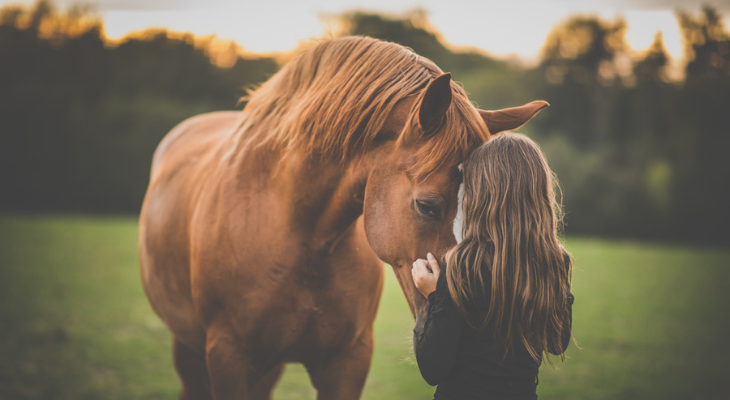
Care Tips for Your Senior Horse
Just like people, horses need special care as they age. Experts say horses enter their senior years between eighteen to twenty years old, even if the age at which a horse shows noticeable signs of aging varies. These tips will help you keep your older horse healthy and comfortable during its golden years.
Schedule Regular Exercise Sessions
Your horse may be slower than it once was, but it still needs regular exercise, particularly if arthritis is a concern. Osteoarthritis, one of the most common types of arthritis in horses, happens when the cartilage at the ends of bones in a joint wears away. Without the protective coating cartilage provides, bones rub together painfully when your horse moves.
Although long trail rides, jumping or vigorous exercise may not be a good idea for a horse with arthritis, gentle, moderate exercise is a must. Exercise relieves stiffness in joints, decreases pain, and strengthens the muscles that support joints. Daily walks on a soft, flat surface can help your senior horse feel its best and prevent weight gain that stresses arthritic joints.
Focus on Nutrition
Your horse's nutritional needs change with age. Digestion, using and absorbing nutrients in foods, becomes more difficult due to hormonal and metabolic changes as horses age, according to the American Association of Equine Practitioners (AAEP). Horses with dental issues, like missing or damaged teeth, may find it hard to chew food.
The AAEP advises feeding a high-fiber, easy to chew diet with essential minerals and vitamins that provides 12 to 16% protein. A commercial senior feed may be needed if your horse's dental issues make grinding hay difficult.
Make Hoof Care a Priority
Although hoof growth may slow in older horses, some growth still occurs. Without frequent hoof trimming, stress on joints and tendons increases, which may increase the pain of arthritis and other conditions.
If your senior horse has become less cooperative at farrier visits, pain and stiffness could be the reason. Your farrier can make the process a little easier by giving your horse breaks and avoiding quick movements that exert pressure on the legs.
Check Saddle Fit
It's not unusual for older horses to lose muscle mass in their backs as they age, which may affect saddle fit and cause sores. For your horse's comfort, check fit often and change saddles if your horse's current saddle no longer fits correctly.
Monitor Your Horse's Condition
Seemingly small issues can quickly become big problems in older horses. Pay attention to changes in your horse's overall condition and look for signs that may mean your horse isn't feeling well, such as:
- Change in Personality
- Weight Loss
- Drinking or Eating Less Than Normal
- Fatigue or Decrease in Stamina
- Lack of Appetite
- Pawing
- Circling
- Lameness
- Swelling or Lumps
- Coughing
- Dull Coat or Eyes
- Watery Eyes
- Discharge from the Nose
- Diarrhea or Failure to Produce Feces
- Sweating When Not Exercising
- Coordination Problems or Swaying
- Lying Down More Often or Repeatedly Lying Down and Getting Up
Sometimes your horse may look fine, but you just have a funny feeling that something isn't quite right. After spending years with your horse, you may notice subtle signs that could indicate a health issue. For your peace of mind and your horse's comfort, call an equine veterinarian if you think your horse might have a health problem.
Schedule More Frequent Visits with an Equine Veterinarian
As your horse ages, it's at an increased risk for developing health issues and may need more frequent veterinary care. Older horses may be more likely to develop colic or Cushing's syndrome, according to the University of Minnesota Extension. Other diseases and conditions that may affect older horses include muscle wasting, weight loss or gain, cancer, or heart disease. An aging immune system may be a factor in more frequent illnesses or infections.
Scheduling veterinary visits at least every six months helps you ensure that your horse receives prompt treatment should it develop a health problem. Your horse may also need more frequent dental care. The AAEP recommends floating (filing) of the teeth by an equine veterinarian once a year for horses younger than 20 and twice per year for horses older than 20. Floating smooths rough edges that can cause sores in your horse's mouth.
Ready to schedule a visit for your senior horse? Contact our office to make an appointment.
Sources:
American Association of Equine Practitioners: Older Horse: Special Care & Nutrition
https://aaep.org/horsehealth/older-horse-special-care-nutrition
University of Minnesota Extension: Caring for Your Senior Horse
https://extension.umn.edu/horse-health/caring-your-senior-horse#vaccinations-and-deworming-1527014
Eclectic Horseman: Signs of Sickness – How to Read Your Horse’s Behavior
https://eclectic-horseman.com/signs-of-sickness-how-to-read-your-horses-behavior/
Practical Horseman: Head to Hoof: Senior Horse Health Concerns, 4/9/2023
https://practicalhorsemanmag.com/health/head-to-hoof-senior-horse-health-concerns/



